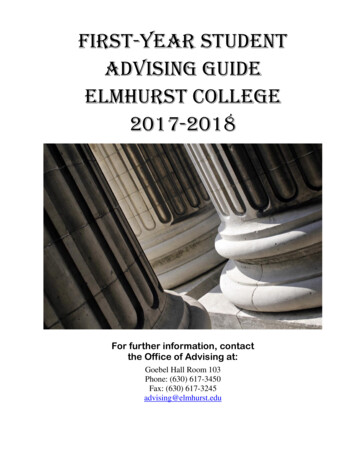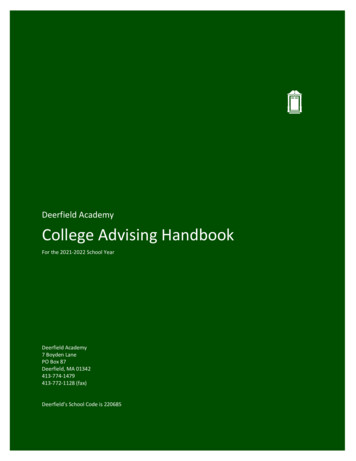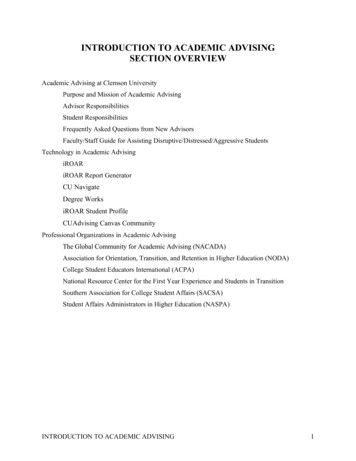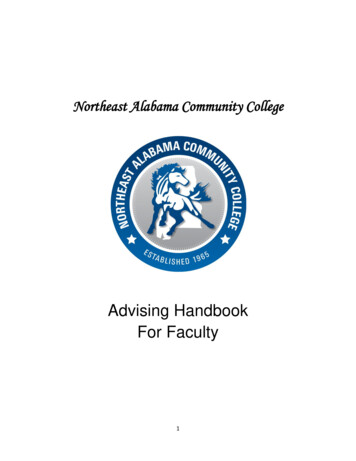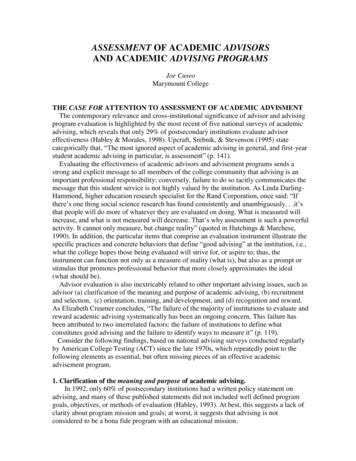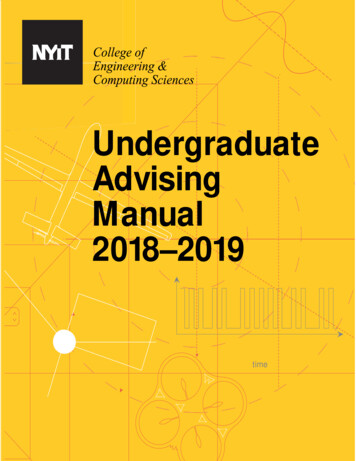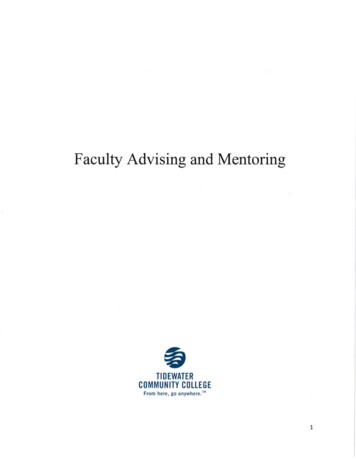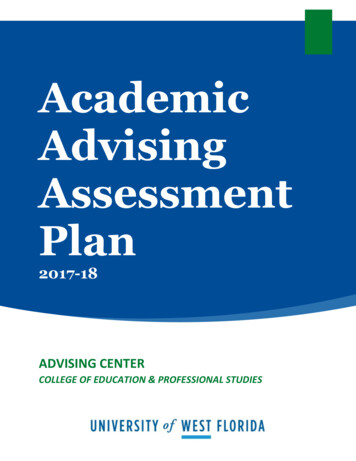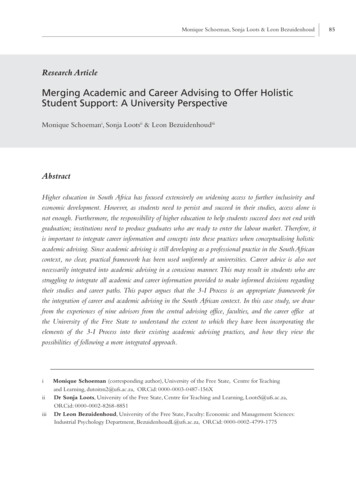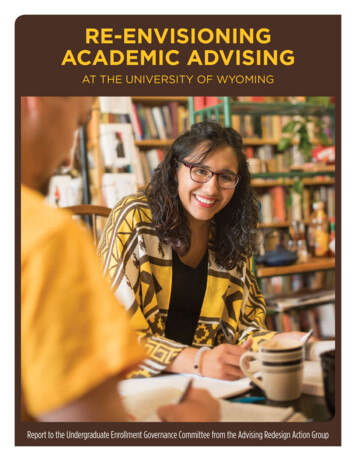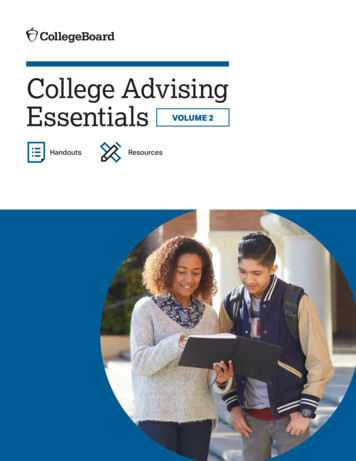
Transcription
College AdvisingEssentialsVOLUME 2HandoutsResources
ContentsVisits from College RepresentativesOrganizing a College FairOrganizing “Major Mania”Finding the Right CollegeWorking with ParentsCollege Planning: How to Get Started20 Questions to Ask College RepresentativesHow to Get the Most Out of a College FairHow to Make the Most of a College InterviewAssessing Your List of CollegesTips for Parents on Finding the Right CollegeA Planning List for Parents of Ninth- and 10th-GradersFamily Action Plan: 11th GradeFamily Action Plan: 12th GradeCollege Resources for Students and Families135789101112131517192123
Visits from CollegeRepresentativesFOR COUNSELORSCollege representatives will visit your school in the fall to meet withinterested students. The representatives meet with students in small-groupsessions and discuss academic programs, campus life, financial aid, andadmission procedures. As more and more students apply to college earlyin their senior year, it is a good idea to allow juniors and even sophomoresto meet with college representatives so they can sail into their senior yearhaving made a personal connection to some colleges.THINGS TO KEEP IN MIND If your students are interested in a college that does nottraditionally have a representative visit your school, callthe admission office and ask if a visit can be scheduled.Colleges are eager to meet prospective applicants. A counselor should be available, whenever possible, togreet the college rep. College representatives say notonly do they value the visit, but a chief goal is to meet thecounselors, and to create or perpetuate a relationshipwith them. Students should be encouraged to meet with a numberof college representatives. Quite often, the rep will be areader of their application, and putting a face to a name isalways helpful. Students might decide a college is not right for themafter the representative’s visit — this helps them definethe type of school they are looking for. If possible, sit in on the representative’s presentation.Often, students are shy, and the counselor can ease thetension by asking a few questions to get the discussiongoing. In addition, attending presentations is an excellentway to know what a college is really like. Be sure to get copies of recent materials from the rep toupdate your files.HAVE ON HAND Your school profile Your business card A college statistics list (colleges that students from your Directions to other local high schoolsschool have attended in recent years)1
GO THAT EXTRA MILE Make sure the representative feels welcome andappreciated. If you cannot greet the representative, ask a parent orstudent volunteer to be there. (A student volunteer whoplans to apply to the school is a nice benefit for both thepresenter and the student.) If possible, provide a quiet location in which they canmeet with students (not the cafeteria during lunch). A convenient parking spot should be arranged.TIP“I encourage students to email thecollege representatives who visit ourschool. It’s nice to have that personaltouch, and it gives students experiencewith communicating in the adult world.”— Lisa Sohmer, Garden School,New York A lunch or a snack is good to provide if the visit is to beat midday.All of this can go a long way toward leaving reps with apositive impression of the school and its students.2 2019 College Board.
Organizing aCollege FairFOR COUNSELORSA college fair features a variety of college representatives who havetraveled to a school or another location to meet with students and theirparents. A school may conduct its own college fairs, collaborate with otherlocal schools, or inform their students and parents of college fairs beinghosted by the National Association for College Admission Counseling(NACAC), which presents college fairs throughout the nation (for a currentlist, go to nacacnet.org).HELPFUL PLANNING HINTS Choose the date early. Counselors who hold their owncollege fairs suggest a lead time of nine months. Work with your state counseling association andregister your fair with NACAC to avoid conflicts. Before inviting colleges, determine how much spaceyou have available. Remember that the more popularcolleges might need a larger space (you might positionthem at the end of a row). Some may even request aseparate room. Send invitations to colleges four months before thefair (end of May for the mid-September fair). Collegerepresentatives begin to finalize their schedules in earlysummer. If you wait until the last minute to invite reps,you won’t get the college participation you would like. Note that some colleges will send alumni rather thanknow that alumni are coming and to give them an ideaof how many students they may see, so they will haveenough materials to hand out. Coordinate scheduling with all other events andactivities at your school. Make sure there will be no athletic events, night classes,or other extracurricular events during your fair. Carefulplanning ensures that you’ll have adequate parking andenough room in the building. Review your budget and plan for things such as tablerental, if needed. Many schools provide food and bottled water for thecollege reps. If your budget is tight, look for help fromthe community (e.g., from restaurants or caterers).college staff. It is helpful to provide suggestions if youTHE FAIR Ask representatives to come an hour early, so they canget a good parking spot and unload their materials.marquee at the local arena, local newspaper) to get theword out. Have student volunteers on hand to help set up the Provide signage for colleges that don’t have proper If you are collaborating with several schools, you Have snacks or light dinner food and beveragestables and to assist reps with their materials.might use community resources (newsletters,identifying banners.available, depending on the time of the day of the fair.3
THE FAIR (CONTINUED) Have a guidebook/directory for families when they arrive.List each school and its location at the fair. Be sure topoint out if a particular school is in its own room. If possible, give a detailed description of each school,including size, location, religious affiliation (if any), mostpopular majors, and mid-50 percent admission test. Provide a list of suggested questions for the studentsand families to ask of the reps. Distribute an evaluation form so that college reps,TIP“In my experience, parents don’t readletters, but they read postcards. Oneimportant postcard I send has the datesand locations of all local college fairs.We mail that out early in the fall.”— Pat Rambo, Springfield High School,Pennsylvaniastudents, and families can give you feedback to use inplanning the next fair. Write follow-up thank-you notes to representatives,helpful community groups, etc.Source: Jan Cannon, Contributor to College Counseling Sourcebook.4 2019 College Board.
Organizing“Major Mania”FOR COUNSELORSSome programs are created by counselors to help students and parentsget a better understanding of college majors. The programs, held annually,begin with a general presentation covering the basics of selecting a major.After that there are two breakout sessions that give students and parentsthe opportunity to attend presentations on two majors. Departmentheads from several universities are invited to give presentations aboutthe major.WHAT THE PRESENTATIONS COVER Academic strengths needed for success in the area ofstudy. A list of courses required in the first two years of atypical program — such as general education coursesand prerequisites for the major. The kinds of jobs the major frequently leads to, and withwhich types of companies or other employers (includinggovernment agencies) it is associated. Employment forecast for graduates in the area of study. The variety of career paths that graduates in the majorcan pursue. Personal experiences of the presenter that would behelpful to a student considering this major. Studentsmight decide a college is not right for them after the repvisit — this helps them determine the type of schoolthey are looking for.PLANNING STEPS If possible, survey students to find out the majors inwhich they are the most interested. Review colleges in your area to determine which oneshave programs for the majors you would like to include. Include community colleges. Contact department heads at least six months before theprogram. Provide them with the type of information (listedabove) to include in the presentation. Let them know howoften they will be giving their presentations during theevening.5
PLANNING STEPS (CONTINUED) Determine the audiovisual requirements well in advance. If possible, open the program to the families of ninth- and10th-graders as well. This will give them a head start onpicking the right major and help them choose high schoolcourses wisely. Prepare students by giving them a list of appropriatequestions to ask the presenters. Have students sign in at each session they attend todetermine which majors attract the most interest. At the end of the event, survey students, parents, andpresenters for their feedback.TIP“I remind students that they don’thave to know their major whenthey’re applying to colleges. For manystudents it’s too much pressure tomake that decision while still in highschool. I encourage those studentsto go to college with an open mind —take a variety of classes, explore theirinterests.”— Missie Heady, West Jessamine HighSchool, KentuckySource: Pat Clipp, Plano West Senior High School. Contributor to College Counseling Sourcebook.6 2019 College Board.
Finding theRight CollegeFOR COUNSELORSCounselors have many conversations with students about the importanceof finding a college that is right for them. Although there are probablymany colleges that a student would find acceptable, applicants who thinkfirst about who they are and what they want from college are more likelyto choose a school that is right for them.THE DISCUSSION Encourage students to compose a potential list thatincludes colleges beyond the ones that their parents orfriends attended or ones that the publishers of collegedirectories deem the best. Instead of starting the discussion with colleges, helpstudents focus on what is important to them — major,activities, location, etc.ABOUT RANKINGSHelp your students understand that those who rankcolleges use certain criteria — endowment, student–faculty ratio, admit rate, and other measurable factors.But these factors may have little or no significance toan individual student. Students should realize that noranked list of colleges can indicate which college isbest for them. Ask an open-ended question about their parents’education in order to get a sense of the family’sexpectations. Convey to students that they need to reflect onwho they are and what their goals are.TIP“I strongly recommend that students andparents read Rugg’s Recommendationson the Colleges by Frederick Rugg. Thisisn’t the usual, basic way of collegesearch. Rugg emphasizes individualistic,personal criteria of interest. Rugg thenlists the schools in alphabetical order —not according to rankings.”— Lynn Ann Lescenski, Veterans TributeCareer and Technical Academy, Nevada 2019 College Board.7
Working withParentsFOR COUNSELORSCounselors work with parents at every point on the spectrum ofawareness of college requirements. Some parents need to be encouragedto view their children as college material and to support them in thecourse work they choose; others have high expectations for their childrenand may have goals that do not mesh with their children’s own goalsand talents.EXPLAINING THE COLLEGE LANDSCAPE Many colleges have more rigorous requirements thanthey did when parents were in college. There is more competition for space in selective andin-state public colleges. Colleges are receiving more applications. Students feel more pressure going through theapplication process. Most schools are more selective than they were 10years ago.EXPLAINING ADMISSION FACTORSTo help parents develop a more realistic view of how theirchild matches up with other applicants at a college, youcan explain some of the factors that selective collegesconsider in making admission decisions: special talents and skills“It’s good to use historical data from thecollege to show the student what thatcollege has decided with students of asimilar background. Directories that showacceptance rates and mid-50 percenttest scores are helpful. It’s best to waituntil the fall of senior year to discussthis, because things can change over thesummer between junior and senior years.” alumnus relationship (if any)— Teri Tippitt,The Kinkaid School, Texas courses taken grade point average rank in class college admission test results activities outside the classroom intended major geographic residency8TIP 2019 College Board.
College Planning:How to Get StartedFOR STUDENTSSTEP 1: GET STARTEDAssess your strengths, weaknesses, goals, passions, learning style, and social skills. What is most important to you in thecollege-search process? What do you hope to learn from the process?STEP 2: MAKE SOME BASIC DECISIONS Where do you want to live? Will you go to college full time? Part time? Do you want to attend a single-sex school, a technicalcollege, a public or private college, a large university,a small liberal arts college, or a historically black orreligiously affiliated college? How important is the cultural/ideological diversity of thestudent body?STEP 3: ENLIST HELPWho do you want to assist you in this process (parents, teachers, siblings, relatives, friends)?STEP 4: CONSULT REFERENCES AND WEBSITESLook at college directories (College Board’s College Handbook, Barron’s, Peterson’s) and use college searches(https://bigfuture.collegeboard.org/). Visit the websites of the colleges that interest you.STEP 5: TALKDiscuss your goals and plans with your parents, teachers, and school counselor. They can provide helpful advice.STEP 6: MEET WITH COLLEGE REPRESENTATIVESVisit with college representatives when they come to your high school. Make a list of your important questions to ask therepresentatives. Also meet college personnel at area college fairs.STEP 7: VISIT CAMPUSESTry to go to the college campus and take a tour, meet with admission and financial aid representatives, and ask studentswhat they think about the college. Can’t make the trip? Many colleges provide virtual tours on their websites.Source: Amherst Regional High School, Massachusetts. 2019 College Board.9
20 Questions to AskCollege RepresentativesFOR STUDENTSWhether you meet them at a college fair or on a campus visit, collegerepresentatives genuinely enjoy talking to high school students andanswering questions about their college. The following questions willhelp start a good dialogue.1. What makes your college unique?11. What’s the security like on campus?2. For what academic programs is your college known?12. What’s the surrounding area like? Is it easy to get around?3. How would you describe the students at your college?13. What are the most popular majors?Where are most of them from?4. Where do students hang out on campus?5. What happens on weekends — are there thingsto do on campus or in town, or do most studentsgo home?6. Are fraternities and sororities a big part of campus life?7. What are the housing options for freshmen?14. How would you describe the academic pressure andworkload?15. What support services (academic advisers, tutors, etc.)are available?16. Do I need to bring my own computer?17. What’s the faculty like? Are they accessible outsideof class?8. Do many students live off campus?18. Are there opportunities for internships?9. Is there a sports complex or fitness center?19. Is there job placement help for graduates?10. What are the most popular clubs and activities?1020. Are there any big changes in the works that I shouldknow about? 2019 College Board.
How to Get the MostOut of a College FairFOR STUDENTSGOING TO A COLLEGE FAIR Take a pen and a small notebook. Take a bag to carry the brochures you pick up. Print out some address labels with your name, address,phone number, email address, high school, and year ofgraduation. Spend your time at the college tables askingquestions, not filling out contact cards! When you arrive, check out the floor plan and find outwhere the tables for your top choice colleges are locatedso you can go directly to them. Write down your most important questions in advanceso you don’t forget them. Check on whether any information sessions, such asfinancial aid, are being offered. Interested? Budget yourtime accordingly. Jot down notes about a college while your memory isfresh, such as right after visiting the table. Pick up the business cards of any representatives youtalk to, so you can contact them if you have any morequestions.AFTER YOU GET HOME Make a point of going through the materials and yournotes within one week after the fair. You’ll probablyremember more about your conversations with collegerepresentatives while the memories from the fair arestill fresh. Follow up with any college that interests you bycontacting the admission office to ask further questionsand, if possible, plan a visit to the campus.Source: Associated Colleges of the Midwest (acm.edu). 2019 College Board.11
How to Make theMost of a College InterviewFOR STUDENTSThe interview is primarily for you to learn about the college and to allowthe interviewer to learn about you. Use it as a tool to assist your collegeselection. The interview can have a positive effect on your admission —rarely a negative one. Relax and be yourself! Your interview will usually be with an admission staffmember, but it may be with a student, an alumnus, or aprofessional interviewer. Keep this person’s perspectivein mind.Questions or comments like, “What kinds of internshipsare offered, and how often do students take them?” showmore maturity in your thinking than asking about thenumber of books in the college library. The interviewer is eager to get to know you and will Interviewers may ask questions about your interests, Be prepared. Know your rank, your test scores, and your Be honest. Everyone has strong and weak points.try to put you at ease. The interviewer will answer yourquestions but will be more interested if you have helpfulquestions that show you have already done someresearch on the college.present areas of interest. If you are undecided aboutyour career, feel free to say so (half of college studentschange their intended major). Think through some areasyou would like to explore, competencies you would like todevelop, and projects or situations that intrigue you. Do your homework about the school to get the obviousquestions answered. You don’t want to be silent whenasked, “What would you like to know about our college?”extracurricular activities/jobs, books you’ve read,meaningful experiences, reasons for applying to thiscollege, life at school, and similar topics. Be ready to talkabout these subjects. Plan to have your interview alone. Most admissionofficers prefer to speak with your parents after talkingwith you, rather than during the interview. Choose appropriate clothes to wear for the interview. When you return home, send a thank-you note to theinterviewer. Thank the person for his or her time and referto something specific you discussed.Source: Adapted from material prepared by Gloria Mueller, Glenbrook High School, Illinois.12 2019 College Board.
Assessing YourList of CollegesFOR STUDENTSAs you develop a list of colleges that interest you, be sure you can answerthese questions about them.THE BASICS Where is the college? Can you locate it on a map? Is it tooclose to home? Is it too far? Is it too cold or too hot there? Have you taken the course work the college requires foradmission? What size is the college? How many students areundergraduates? What is the college’s selectivity ratio (what proportion ofapplicants were admitted last year)? Does the college offer majors that interest you? Is the college coed or single sex? What percentage of students live off campus? How many of the students graduate in four years? Fiveyears? Six years? How many first-year students return for their sophomoreyear? How much does the program cost? What is the total peryear expense? What type of financial aid is available?WHERE WOULD YOU FIT IN? What are the admission test scores at the colleges of Are freshmen guaranteed on-campus housing? If not, What were the high school GPAs of most of the freshmen Are there extracurricular activities that interest you?interest to you? Where does that place you?last year?where do they live?VISIT THEIR WEBSITES AND READ COLLEGE GUIDEBOOKS What are their strong academic programs? (Ask a college Do the pictures and the language the college uses to What courses are required for graduation? What is your general impression of the college? Are the courses you need/want available each semester? Is the school accredited?representative, students, graduates, and teachers.)At convenient times? Are there special programs (study abroad, internships,etc.) of interest to you? What is the social life like? What percentage of studentsdescribe itself attract you? If professional certification is required for employmentin the field that interests you, how many studentsenrolled in the school’s program pass the certificationexam?join fraternities or sororities?13
ADMISSION PROCESS When are applications due? What does the application contain? Are essays required? Is an interview suggested or required? Is an interviewavailable from staff or alumni? When may you visit the college? What is its policyregarding campus visits? What are the financial aid deadlines? What financial aidforms are required?NOW ANSWER THESE QUESTIONS Am I a strong candidate for admission to this college? Do I want to visit this college? If I am not a strong candidate, what are my chances? What additional information do I need?Source: Susan Staggers, Cary Academy, North Carolina.14 2019 College Board.
Tips for Parents onFinding the Right CollegeFOR PARENTSHow can your child find colleges that match specific needs? First, identifypriorities. Next, carefully research the characteristics of a range of schools.Finally, match the two. Here are some college characteristics to consider.SIZE OF STUDENT BODYSize will affect many of your child’s opportunities andexperiences: range of academic majors offered extracurricular possibilities amount of personal attention your child will receiveIn considering size, your child should look beyond theraw number of students attending. For example, perhapsthey are considering a small department within a largeschool. Your child should investigate not just the numberof faculty members, but also their accessibility tostudents. number of academic resourcesLOCATIONDoes your child want to visit home frequently, or isthis a time to experience a new part of the country?Perhaps an urban environment is preferred, with accessto museums, ethnic restaurants, or major league ballgames. Or maybe it’s easy access to the outdoors orthe serenity of a small town.ACADEMIC PROGRAMSIf your child has decided on a field of study, they canresearch the reputation of academic departments bytalking to people in their field of interest. If your childis undecided, as many students are, they may want tochoose an academically balanced institution that offersa range of majors and programs. Students normallydon’t pick a major until their sophomore year, and thosestudents who know their major before they go to collegeare very likely to change their minds. Most colleges offercounseling to help students find a focus.In considering academic programs, your child shouldlook for special opportunities and pick a school thatoffers a number of possibilities.CAMPUS LIFEBefore choosing a college, your child should learn theanswers to these questions: What extracurricular activities, athletics, clubs, andorganizations are available? Does the community around the college offer interestingoutlets for students? How do fraternities and sororities influencecampus life? Is housing guaranteed? How are dorms assigned?15
COSTIn considering cost, look beyond the price tag. Becauseof financial aid, most students pay less than the “stickerprice,” so don’t rule out a college that would be a goodfit for your child before you find out how much financialaid it will offer. Most colleges work to ensure thatacademically qualified students from every economiccircumstance can find financial aid that allows themto attend.DIVERSITYYour child should explore what the advantages of adiverse student body would be. The geographic, ethnic,racial, and religious diversity of the student body can helpstudents learn more about the world. Investigate whichstudent organizations or other groups with ethnic orreligious foundations are active and visible on campus.RETENTION AND GRADUATION RATESOne of the best ways to measure a school’s qualityand the satisfaction of its students is to learn thepercentage of students who return after the firstyear and the percentage of entering students who16go on to graduate. Comparatively good retention andgraduation rates indicate that responsible academic,social, and financial support systems exist for moststudents. 2019 College Board.
A Planning Listfor Parents of Ninthand 10th-GradersFOR PARENTSIt may seem early to start thinking about getting your child ready forcollege, but it really isn’t — important groundwork should take placein ninth and 10th grades. Here’s a list to help you make sure your childis on the right path.GRADE 91. Create a four-year high school plan. Once your child issettled into ninth grade, introduce the idea of preparingan overall plan for high school that relates to their goals. Make sure you and your child know what high schoolcourses are required by colleges, and that their ninthgrade courses are on the right track. Map out when these courses should be taken. Familiarize yourself with the various levels of coursesoffered by your child’s school.2. Tell your child to start thinking about careers.Encourage your child to develop a tentative career goal.Of course it will change — often — but it’s the thoughtprocess that counts. Help your child to identify interests — likes anddislikes — not just in academics but in all areas. Thiswill help your child focus on goals. Encourage your child to discuss career options withothers, such as the school counselor, teachers, recentcollege graduates who are working, professionals inthe community, etc.3. Suggest extracurricular activities. Encourage yourchild to actively take part in a sport, school club, music ordrama group, or community volunteer activity. If your child may want to play sports in college,eligibility requirements. The NCAA requires completionof certain core courses; you can find the specifics ateligibilitycenter.org.4. Meet with the school counselor. The school counselorknows how to help your child get the most out of highschool. Make sure your child has an opportunity duringthe school year to discuss post-high-school plans withthe school counselor and map out courses to take duringthe rest of high school. You should participate in this meeting, too.5. Ask if the PSAT 8/9 is offered to ninth-graders. ThePSAT 8/9 will help you and your child’s teachers figure outwhat your child needs to work on the most so that they’reready for college when they graduate from high school.It tests the same skills and knowledge as the SAT ,PSAT/NMSQT , and PSAT 10 — in a way that makessense for their grade level.6. Save for college. It’s still not too late to start a collegesavings plan, if you haven’t already. Every little bit helps! Investigate state financial aid programs and 529 plans.7. Obtain a Social Security number for your child ifyou don’t already have one. This is often requiredfor applications, testing, scholarships, and otheropportunities.research the National College Athletic Association17
GRADE 101. Meet with the school counselor — again. Make sureyour child meets with their school counselor to ensurethat she or he is enrolled in college-preparatory courses. Check to see that your child is taking any prerequisitesto advanced-level junior- and senior-year courses.2. Ask if the PSAT 10 or PSAT/NMSQT is offered to10th-graders. While the PSAT/NMSQT is usually takenin the 11th grade, it is also often offered in the 10th.That’s because it provides invaluable feedback on thestudent score report; 10th-graders can then work on anydisclosed academic weaknesses while there is still ampletime to improve them.4. Attend college and career fairs. These often take placein the fall at your school or in your area.5. Support your child’s participation in a school activityor volunteer effort. Extracurricular activities helpstudents develop time-management skills and enrich theschool experience.6. Tour college campuses. If possible, take advantageof vacation or other family travel opportunities to visitcolleges and see what they’re like. Even if there is no interest in attending the college you3. Is your child interested in attending a U.S. militaryare visiting, it will help your child learn what to look forin a college.academy? If so, they should request a precandidatequestionnaire and complete it. Your school counselorcan help with this.Visit bigfuture.collegeboard.org for more d 2019 College Board. PSAT/NMSQT is a registered trademark of College Board and National Merit Scholarship Corporation.
Family ActionPlan: 11th GradeFOR FAMILYJunior year usually marks a turning point. This is because for moststudents and families, it’s when college planning activities kick into highgear. Here are some things you can do this year to support your child andgive
Finding the Right College. 7. Working with Parents. 8. College Planning: How to Get Started. 9. 20 Questions to Ask College Representatives. 10. How to Get the Most Out of a College Fair. 11. How to Make the Most of a College Interview . 12. Assessing Your List of Colleges. 13. Tips for Parents on Finding the Right College. 15
